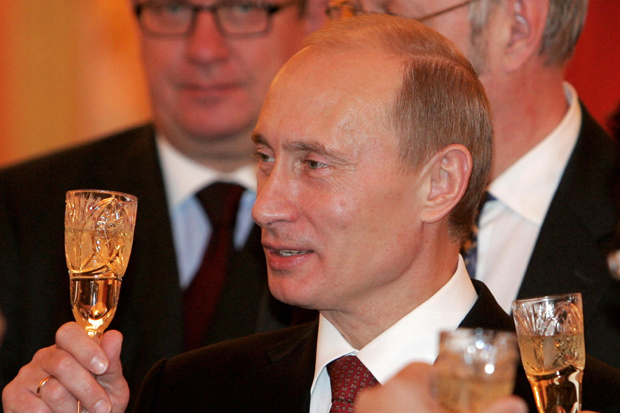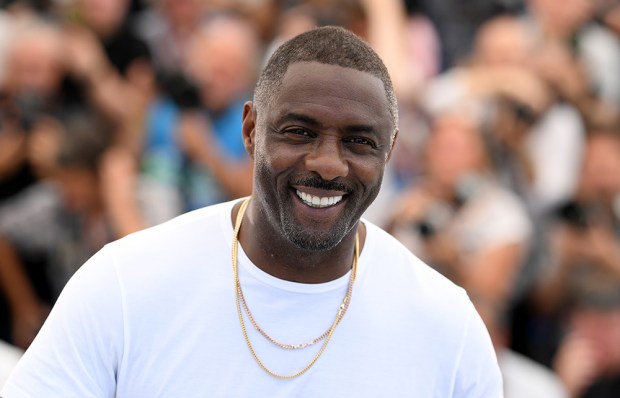An aeon ago, when I was first invited to the odd City lunch, there was a standard formula: G&T, white, red, port, brandy, cigars, with stumps drawn at around a Test match tea interval. But there was a problem. By 8 a.m. local time, when Manhattan was champing at the telephone, London would be at lunch. By the time the call was returned, it would be apparent that lunching had taken place. ‘My Dear Cyrus, how nice to hear your voice. Are you planning to cross the big pond? If so, we’ll have a jolly good lunch.’ Cyrus thought to himself: ‘Is that all those Limeys ever do: have lunch?’ Within a few years, post-Big Bang, the Cyruses did cross the big pond, but not to enjoy lunch. There is an assumption, reinforced by priggishness, that the ensuing puritanism has improved the City. Is that necessarily so?
Anyway, there is at least one building where the old rites are still used. Last week, I went to an immensely stimulating luncheon. We drank Corton–Charlemagne, Dme-Bonneau du Martrey, ’09, followed by a L’Evangile ’01. It was a tribute to the quality of the talk that we did not spend more time analysing and praising those superb wines. Our host had assembled a lively table. There were formidable bankers and lawyers, the historian Michael Burleigh and a few former diplomats: some from the official wing of the FCO, others from its transpontine branch.
A couple of Enigma machines were on display, which was appropriate, for we were discussing Russia. I was sufficiently temerarious to argue that the West could have done more to embrace post-Soviet Russia. Once we had won the Cold War, we should have scrapped our concepts while retaining our weapons systems. We needed a new system of collective security, one capable of including the new Russia.
Nato had been established to keep the Germans down, the Russians out and the Americans in. The first of those objectives is long since obsolete. After the liberation of East Germany, Poland, Czechoslovakia, Hungary et al, the second was surely less pressing. As for the third, we still needed Nato, if only to ensure a continuing American presence: the Europeans would never have been prepared to spend enough to defend themselves. But with the end of the Soviet Union, the West had no reason for a strategic quarrel with the Russians. It should not have been impossible to create structures which reflected this. Instead, we encouraged Nato expansion, in a haphazard way. One can understand why the Baltic states wanted to join. But admitting them merely undermined Nato’s credibility. De Gaulle said that the Americans would never have swapped Detroit for Düsseldorf. Fortunately, we never found out whether he was right. But no one is going to swap one of their cities for Riga. It would be fatuous to pretend otherwise.
Although it is also easy to see why Ukraine and Georgia want to join Nato, that cannot happen. Those countries are condemned to live in a dangerous neighbourhood, and fantasies are useless. If your dwelling is next to a fierce bear’s cave, the odd pot of propitiatory honey might help. There is no point in shouting rude slogans in the hope that your big brother will rush to the rescue. Big brother is good for a resolution at the UN, nothing more — and anyway, the bear will veto it.
Others, much more expert than I, doubted whether if would ever have been possible to reach an accommodation with Russia. Though the subject was too complex for consensus, there were two points of agreement. First, the Cold War had restarted: second, the next ten years were going to be a fascinating period, but not necessarily a successful one. The Evangile, as intellectually rigorous as any Graves, was the perfect counterpoint to our session. It engendered a wholly appropriate mood of eupeptic pessimism.
The post From Bordeaux to Nato appeared first on The Spectator.
Got something to add? Join the discussion and comment below.
Get 10 issues for just $10
Subscribe to The Spectator Australia today for the next 10 magazine issues, plus full online access, for just $10.
You might disagree with half of it, but you’ll enjoy reading all of it. Try your first month for free, then just $2 a week for the remainder of your first year.















Comments
Don't miss out
Join the conversation with other Spectator Australia readers. Subscribe to leave a comment.
SUBSCRIBEAlready a subscriber? Log in